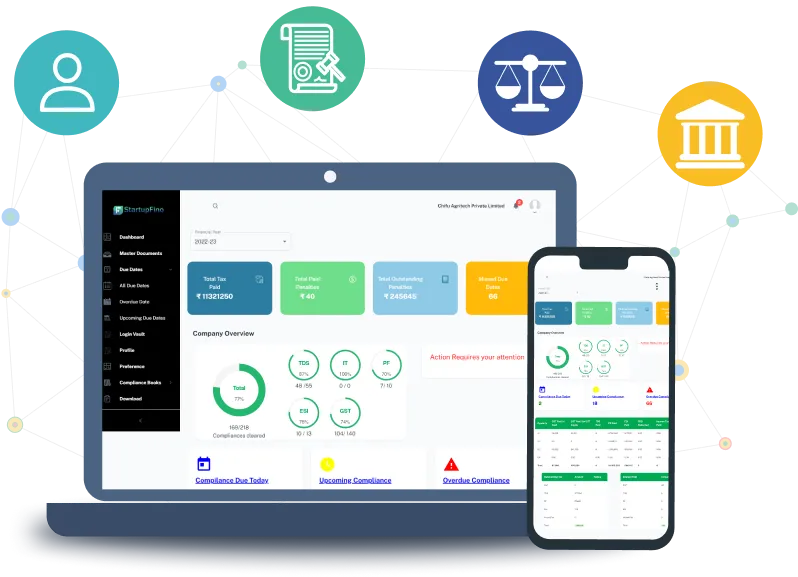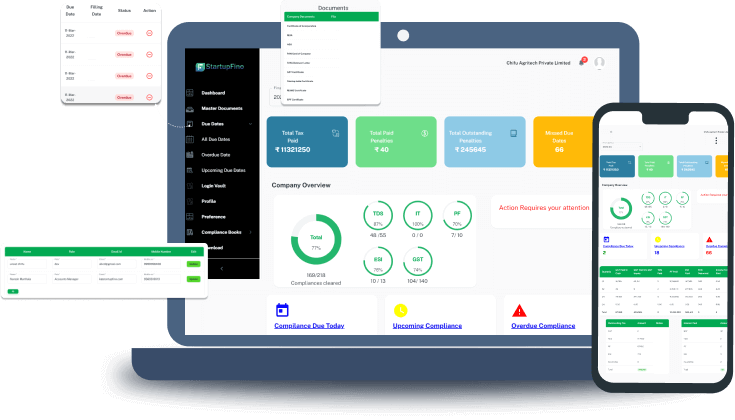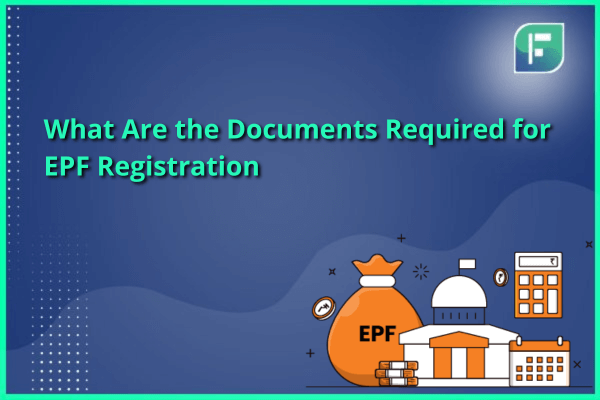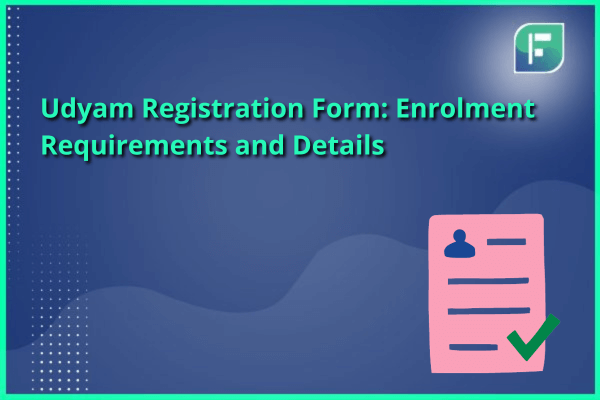Professional tax is a direct tax imposed on individuals earning income through professions, employment, trades or callings. Unlike central government income tax, professional tax is enforced by the state or union territory government in India.
In simple language, Professional Tax registration is for the tax imposed by the State Government to fund and support the infrastructure necessary for citizens to conduct their professions. The tax amount is determined based on the income generated from:
- Profession
- Trade
- Employment
The regulations and rates of Professional Tax vary from state to state, each adhering to its own set of rules. another, but there is a maximum limit of Rs. 2500/- per year. Generally, states utilise a slab system based on income levels to levy professional tax. Additionally, individuals engaged in freelancing or self-employed businesses without any employees must obtain a Professional Tax certificate in accordance with the monetary threshold, if specified, by the respective State Authorities.
Professional Tax Registration in Applicable States
Given below are the states where registration for professional tax is needed in India:
|
Indian States/Union Territories with Professional Tax
|
Indian States/Union Territories without Professional Tax
|
|
Andhra Pradesh
|
Arunachal Pradesh
|
|
Karnataka
|
Himachal Pradesh
|
|
Maharashtra
|
Delhi
|
|
Tamil Nadu
|
Haryana
|
|
Assam
|
Uttar Pradesh
|
|
Kerala
|
Uttarakhand
|
|
Meghalaya
|
Andaman and Nicobar Islands
|
|
Tripura
|
Daman & Diu
|
|
Bihar
|
Dadra and Nagar Haveli
|
|
Jharkhand
|
Lakshadweep
|
|
Madhya Pradesh
|
Jammu & Kashmir
|
|
West Bengal
|
Punjab
|
|
Manipur
|
Rajasthan
|
|
Mizoram
|
Chandigarh
|
|
Odisha
|
Goa
|
|
Puducherry
|
|
|
Sikkim
|
|
|
Telangana
|
|
|
Nagaland
|
|
|
Chhattisgarh
|
|
|
Gujarat
|
|
Benefits of Professional Tax Registration in India
Registering for Professional tax offers numerous advantages for individuals and businesses. Given below are the key benefits associated with registration for professional tax:
1. Legal Compliance
Registration for professional tax ensures strict adherence to tax laws and regulations established by state governments or union territories. This compliance helps individuals and businesses fulfil their legal obligations, mitigating the risk of penalties and legal complications.
2. Avoidance of Penalties
Failure to register for professional tax can lead to penalties and fines imposed by relevant authorities. Proactive registration helps prevent unnecessary financial liabilities and legal consequences, contributing to financial stability.
3. Employee Deductions
Employers who hold the registration can deduct the applicable tax amount from their employees' salaries. This facilitates regular and timely tax payment, streamlining the taxation process for both employers and employees.
4. Proof of Compliance
The professional tax certificate serves as tangible evidence of tax compliance. It proves valuable when interacting with government authorities, financial institutions or potential clients who require verification of tax adherence.
5. Access to Government Benefits
Registration may grant individuals or businesses access to specific government benefits, schemes or incentives. These advantages can include participation in social welfare programs, eligibility for subsidies or preferential treatment in government contracts and tenders.
6. Enhanced Business Reputation
Professional tax registration showcases a commitment to ethical business practices and adherence to legal frameworks. This enhances the reputation and credibility of individuals and businesses, fostering trust among clients, partners and stakeholders.
7. Simplified Tax Management
Registration simplifies tax management by providing clarity and a structured approach to tax obligations. Individuals and businesses can accurately track and fulfil their tax responsibilities, ensuring smooth financial operations and reducing stress and confusion.
Types of Professional Tax Certificates
Different types of professional tax certificates available in India are:
1. PTEC (Professional Tax Enrolment Certificate)
The PTEC or Professional Tax Enrolment Certificate, is a crucial document related to professional tax payments. This certificate is applicable to various entities, including Private and Public Limited Companies, as well as individuals such as Sole Proprietors and Directors. It serves as a means for these entities or professionals to fulfil their professional tax obligations.
2. PTRC (Professional Tax Registration Certificate)
The PTRC or Professional Tax Registration Certificate, plays a vital role in the professional tax framework. This certificate involves the deduction of professional tax from the salaries of employees by both Government and Non-Government employers. The deducted tax amount is subsequently deposited with the government, ensuring compliance with professional tax regulations.
Eligibility for Professional Tax Registration
The eligibility criteria for registration for professional tax are subject to variation based on specific regulations. The following categories of individuals and entities are eligible for registration:
1. Individuals engaged in a profession, employment, calling or trade:
Professionals working in diverse fields such as medicine, law, engineering and others are eligible for professional tax registration.
2. Employers making salary/wage payments:
Employers, whether in the public or private sector, who hire individuals and disburse salaries or wages, are obligated to register for professional tax.
4. Self-employed professionals:
Self-employed individuals, like freelancers, consultants and sole proprietors, must register for professional tax based on their income or business operations.
5. Businesses operating in India:
Various types of businesses, including partnerships, sole proprietorships and companies, functioning within India's boundaries are qualified for professional tax registration.
6. Non-resident individuals or foreign companies with employees working in India (exempt):
In certain cases, non-resident individuals or foreign companies employing personnel in India may be exempt from professional tax registration, subject to specific regulations.
Exemptions for Payment of Professional Tax
Under the Professional Tax Rules, specific categories of individuals are eligible for exemptions from paying Professional Tax. These exemptions are designed to provide relief to certain segments of the population. The following categories of individuals are exempted from paying Professional Tax:
- Parents of Children with Permanent Disability or Mental Disability: Parents or guardians of children with permanent physical or mental disabilities are exempt from paying Professional Tax. This exemption recognises the additional financial responsibilities faced by families with disabled children.
- Members of the Armed Forces: Individuals serving in the armed forces as defined by the Army Act 1950, the Air Force Act 1950 and the Navy Act 1957, including members of auxiliary forces or reservists, while serving in the state, are exempt from Professional Tax. This exemption acknowledges their service to the nation.
- Badli Workers in the Textile Industry:Badli workers in the textile industry, who often work as substitutes for regular employees, are eligible for an exemption from Professional Tax.
- Individuals with Permanent Physical Disabilities (Including Blindness): Individuals who have a permanent physical disability, including blindness, are exempt from Professional Tax.
- Women Engaged in Specific Programs: Women exclusively engaged as agents under the Mahila Pradhan Kshetriya Bachat Yojana or Director of Small Savings are exempt from Professional Tax.
- Parents or Guardians of Individuals with Mental Disabilities: Parents or guardians of individuals who have a mental disability are exempt from paying Professional Tax. This exemption acknowledges the caregiving responsibilities of these individuals.
- Individuals Above 65 Years of Age: Individuals aged 65 years or older are exempt from Professional Tax. This exemption recognises the challenges faced by senior citizens in the workforce and their reduced income levels during retirement.
These exemptions are intended to provide financial relief to specific groups and individuals who may face unique circumstances.
Essential Documents Required for Professional Tax Registration
To initiate the registration process, you will need to provide a set of essential documents. These documents vary depending on the type of entity applying for registration. Given below is a list of the important documents required:
1. Application Form:
The application form for Professional Tax Registration is the initial document needed to commence the registration process. Thereafter, we need to see what are the particular requirements for companies, their directors, etc. including bank details and other such miscellaneous documents.
2. For Companies:
The documents needed for companies are:
- Certificate of Incorporation: A copy of the Certificate of Incorporation is needed for companies to prove the company's legal status.
- Articles of Association & Memorandum of Association: AOA and MOA documents outline the company's rules, regulations and objectives. These should be submitted along with the COI.
- Permanent Account Number: The company's PAN card is essential and should be attested by the Director.
3. For Directors (All Directors):
- Address Proof and Identity Proof: Address and identity proofs of all directors must be provided. This typically includes documents such as Aadhar card, passport or driver's licence.
- Passport Size Photos: Recent passport-size photographs of all directors are required.
4. Bank Details:
- Bank Account Details: Details of the company's bank account, including the account no. and name of that bank are needed.
- Bank Statement: A bank statement for showing the recent financial transactions of the company is also required.
- Cancelled Cheque: A cancelled cheque bearing the company's name and account details should be provided.
5. Proof of Registered Office:
- In the case of a rented property, a Rent Agreement demonstrating the company's registered office address is needed.
- If the property is owned by the company, no-objection certificate from the owner may be required.
6. Additional Documentation for Specific Entity Types:
In the process of professional tax registration, specific document requirements may apply and these can vary depending on the type of entity and the regulations of the particular region or jurisdiction. Some common document requirements are:
- Board Resolution: Companies need a board resolution authorising the registration process.
- Declaration of Consent: Partnerships usually require a declaration of consent from the relevant partner.
- Salary and Attendance Register: Some entities may be required to provide a salary and attendance register.
Procedure for Professional Tax Registration
The procedure for registration for professional tax may vary from state to state within India. Professionals and employers seeking professional tax registration should follow the general procedure outlined below:
Step 1: Filing the Application with Necessary Documents
The journey begins with the applicant completing the application form very carefully and attaching all required documents to it.
Step 2: Submitting the Application to the Concerned State Government & Tax Department
Subsequently, the applicant must submit the application form along with the documents to the pertinent state government office responsible for professional tax matters. Simultaneously, a copy of the application should be furnished to the respective tax department.
Step 3: Scrutinisation by the Tax Authority
Upon receiving the application, the tax authority initiates a detailed scrutiny. This involves a comprehensive review of the application and associated documents to validate the accuracy and compliance with all applicable regulations.
Step 4: Issue of Registration Certificate
Upon successful scrutiny and verification of compliance with requirements, the tax authority issues the Registration Certificate. This certificate is tangible proof of the registration, affirming adherence to the pertinent tax laws and regulations.
It's important to emphasise that the steps and prerequisites for professional tax registration can vary across states in India. Also, individuals may need to observe specific timelines for filing returns, which may differ based on state requirements.
Penalties Imposed in Case of Violation of Professional Tax Regulations
The specific penalties for violation of professional tax and its many regulations fall under the following categories:
1. Failure to Obtain Registration
The defaulter is liable for a penalty for the period during which they remain unregistered. Penalties may be applied for failure to initiate registration once professional tax becomes applicable.
2. Late Deposition
A penalty is levied for delays in depositing the required professional tax amount to the government.
3. Non-Deposition of Amount
If an individual or entity fails to deposit the requisite professional tax amount, it can be recovered by officials along with interest from the defaulter's assets. Additionally, a penalty is applicable and authorities may have the power to attach the defaulter's bank account. In severe cases, prosecution cases may also be filed.
4. Late Payment or Non-Payment of Tax
Late payment or non-payment of professional tax is subject to penalties. The penalty amount is typically a percentage of the unpaid tax amount. The exact percentage may vary by state.
5. Late Filing of Returns
Individuals or entities failing to file their professional tax returns within the specified due date may be liable to pay penalties. The penalty amount can vary but may include a fixed penalty for late filing, with an additional penalty if the delay exceeds one month.
Specific Penalty Amounts
The specific amounts mentioned for penalty are:
Late Registration: A penalty of Rs 5 per day may be imposed for late registration certificate obtainment.
Late Payment: The penalty for non or late payment of professional tax is typically 10% of the outstanding tax amount.
Late Filing of Returns: A fixed penalty of Rs 1000 may be applicable for late filing of professional tax returns, with an increased penalty of Rs 1000 if the delay exceeds one month.
Responsibilities of Employers Regarding Professional Tax
Employers play a pivotal role in ensuring compliance with professional tax regulations. Their responsibilities include various aspects of tax management and adherence to legal requirements and include:
1. Registration:
Employers are responsible for registering themselves and their employees for professional tax with the relevant tax authorities. Obtaining the necessary registration certificates and following the registration process within the prescribed timeframe is important.
2. Tax Deduction:
Employers are responsible for deducting professional tax from the salaries of their employees as per what is the prevailing tax rate and this deduction should be made at the time of salary payment.
3. Timely Payment:
Employers are obligated to ensure that the deducted professional tax is promptly paid to the appropriate tax authorities. Adhering to designated payment schedules and fulfilling tax obligations in a timely manner is essential to avoid penalties and legal consequences.
4. Record-Keeping:
Employers should maintain accurate records related to professional tax deductions, payments and employee details. These records must be well-organised, retained and made available for inspection by tax authorities when required.
5. Compliance with Tax Laws:
Employers must rigorously comply with all relevant tax laws, rules and regulations concerning professional tax. Staying informed about changes in tax rates, thresholds or filing requirements and ensuring compliance is imperative.
6. Reporting and Filing:
Employers are responsible for the timely reporting and filing of professional tax returns, as mandated by tax authorities. Providing accurate information about employees, deductions and payments during specified reporting periods is essential.
7. Communication with Employees:
Employers should maintain effective communication with their employees regarding professional tax deductions. Informing employees about payment details, changes in tax regulations and related matters helps maintain transparency and prevents disputes.
Due Dates for Professional Tax Payment
The due dates for professional tax payment in India depend on the number of employees an employer has. Given below are the tax payment schedules based on the number of employees for professional tax in India:
|
Number of Employees
|
Due Dates for Professional Tax Payment
|
|
More Than 20
|
Payment is due in 15 days from the month end.
|
|
Less Than 20
|
Payment is required to be made on a quarterly basis i.e. in simpler words, the payment should be made by the 15th of the following month from the end of the quarter..
|
Professional Tax Return
Individuals and entities with registration are obligated to file the Professional Tax Return, with the specific due dates for filing varying across different states. The deadlines for filing the return may differ based on the regulations of the respective state or union territory.
Consulting with local tax authorities or professionals can help in understanding and meeting these compliance requirements.
Persons Accountable to Collect and Pay Professional Tax
Professional tax is a tax that applies to individuals earning income, but the responsibility for its collection and payment varies from state to state within India. Given below are key points regarding the persons accountable for collecting and paying professional tax:
1. Taxpayer Responsibility:
Every individual who earns income is liable to pay professional tax based on the rules and regulations of the respective state.
2. Variation by State:
Each state government has the authority to determine the tax rates and slabs applicable within its jurisdiction.
3. Collection by Commercial Tax Department:
The collection of professional tax is typically managed by the Commercial Tax department of the respective state government.
4. Certificates for Collection:
Professional tax is collected from individuals and entities holding Professional Tax Enrolment Certificates and Professional Tax Registration Certificates. These certificates serve as official documentation of registration for professional tax payment.
5. Maximum Amount Limit:
It's important to emphasise that there is a maximum annual cap on the professional tax amount an individual is obligated to pay, which stands at Rs. 2500. This cap signifies that irrespective of an individual's income level, they should not pay more than this stipulated amount as professional tax within a single year. This provision offers a clear ceiling, providing relief to individuals from an excessive burden of professional tax based on their earnings.
Why Choose StartupFino for Professional Tax Registration?
Each state government can have its own set of rules and regulations governing professional tax, including criteria for exemptions. It's essential for individuals and entities to familiarise themselves with the specific guidelines outlined by their respective state governments to accurately understand the applicability and exemptions related to professional tax in their region. Seeking guidance from professionals like StartupFino can provide clarity on this matter.
StartupFino is a company that specialises in offering complete Professional tax registration services. We can help you with everything from providing advice in the initial phase to ensuring that you meet all the necessary requirements and compliances post Professional tax registration.







